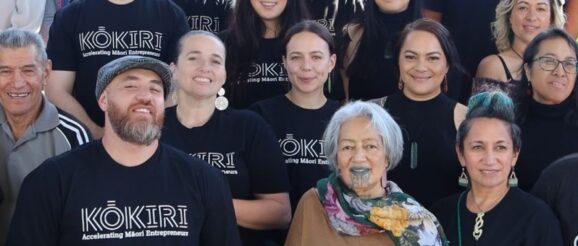There’s nothing wrong with picking winners in Māori innovation

NZ’s problem was never with picking winners, it was with demonstrably picking losers. Now, bringing together driven young people with investors and good advice is part of building a healthy economy.
Opinion: One of the key signs of positive economic and social activity is people starting up new ideas. Putting into action things they think will make a positive difference to their lives and the lives of those around them.
Not all of these work in practice – far from it. Still less gain enough traction to support themselves. Less again become big financial successes or get adopted by government or other agencies at a level that realises the initial dream.
A society that does not have such ideas and actions flowing stagnates. Though some like to claim this is a unique characteristic of capitalism, this is not true.
Māori values giving Māori businesses an edge
* Normalising Te Ao Māori in the workplace key to dispelling whakamā
* For small Māori business, together is stronger
Capitalism is an effective mode of growing and implementing some types of ideas and extracting gain from them. It’s not the same thing. Our current version of capitalism also tends to accumulate and centralise power and resource often to the detriment of smaller, localised economic and social activity.
I have recently had the privilege of seeing a local “business accelerator” in action and having a very limited participation. Kōkiri is a kaupapa Māori programme, which “supports and accelerates the development of early-stage impact positive startups into investment-ready ventures”.
It is supported by a range of government and private agencies and has just completed its fifth cohort through its programme. Saara Tawha working from within Te Wananga o Aotearoa in the Waikato currently leads the team. Anyone who gets involved can only be struck by the energy, intelligence and drive of that team.
I know there is a range of other accelerator programmes around the country – we get involved with some at Ara Ake the New Energy Development Centre based in Taranaki, which I chair. They each have their own strengths and each is important to a healthy infrastructure of innovation and idea building.
This is work that takes place outside of the main marketplace of investment and banking – it is not the stuff of the business press or big conferences, but it is where it all starts. A special power of Kōkiri is its kaupapa Māori base which drives its choice of participants, the support process and the type of activities involved.
The cohort just completed has a wide range of activities, and each now has developed its initial idea and prototypes or trials and is moving closer to an investment proposal. Initial investor pitches have been prepared and presented in a “graduation” event this past week. Each has a long way to go, but each has a much better chance of meeting its goals than without Kōkiri.
Just a few of the innovations:
* Ako Academy is an adaptive AI-driven app which assists early learners of Te Reo;
* Hiwa develops location-tracking technology and applications in safety and people management;
* Urutapu develops sustainable and culturally appropriate funeral services based around woven flax caskets (Kopaki Tupapaku).
Others cover a range of environmentally sound products and a strong group of digital, video, gaming, and design applications consistent with the interests and needs of rangatahi especially.
Who knows if something big and widely applied comes out of the group? I hope it does but the process of bringing together young people with ideas and drive, experienced investors, and educational and innovation advice within a framework of mutual support and social purpose is all part of building a healthy economy.
This is not about fighting deficits but about supporting positive indigenous initiative. There is such a lot of that all around us.
We went through a political period when “picking winners” was disparaged as a policy. When it was thought that only survival in an individualistic jungle was effective in innovation. That was never true, and more recently we have been focusing on the sort of supportive environments that better identify, nurture and, where appropriate, grow new ventures.
Rather like advertising and marketing spend, some of this will be wasted but also like that spend you never know what part will succeed. So we are best to support broadly but carefully.
After all, when you look at the total context of government spend on industry support of various kinds, the issue is not too much on picking winners but on demonstrably picking losers or at least picking the past rather than the future.
Kōkiri actively champions a more innovative and inclusive future. Promoting, backing, and leading Māori innovation as its name suggests. We all benefit.
